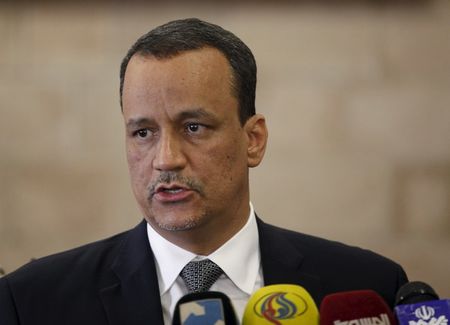
United Nations (U.N.) special envoy for Yemen, Ismail Ould Cheikh Ahmed speaks to the media upon departure after a five-day visit to Yemen’s capital Sanaa January 14, 2016. REUTERS/Khaled Abdullah
Washington-The UN Special Envoy for Yemen said the country is living “through the hardest trending days in its history.”
The UN special envoy for Yemen said he was unable to call another round of peace talks because the opposing parties were deeply divided over whether there should be a ceasefire to coincide with a new round of negotiations.
During the first round of talks in Geneva in December, the parties agreed on a broad framework for ending their war but a temporary one-week truce was widely violated. A second round of talks was set for Jan. 14, but has been indefinitely postponed.
UN Yemen envoy, Ismail Ould Cheikh Ahmed, told the U.N. Security Council: “deep divisions persist that prevent me from calling for the next round of talks”.
“I have not, unfortunately, received sufficient assurances that a new cessation of hostilities, should I call for one, would be respected,” he added.
“We cannot delay these talks after March,” he told reporters after the briefing. “A political solution is becoming more than ever needed today and we need to precipitate these talks as soon as possible.”
A Saudi Arabia-led coalition began a military campaign in March to prevent Iran-allied Houthi rebels and forces loyal to former Yemen President Ali Abdullah Saleh, from taking complete control of Yemen.
The United Nations said more than 6,000 people had been killed in the past year, of which about half were civilians.
UN sanctions monitors said in a report last month that Houthi rebels have targeted civilians in attacks that could be a crime against humanity.
“Yemen has suffered greatly, and its people have withstood an unspeakable tragedy,” Ould Cheikh Ahmed said.
“The country’s infrastructure is destroyed; families dispersed, and its social fabric torn apart. This is a critical and most difficult phase. With every passing day, more and more Yemeni lives are lost,” he stated.
He also said “the conflict in Yemen is political, so the solution must also be political”, adding that only an inclusive peace process would ensure a future or reconciliation and peace in the country.
Ould Cheikh Ahmed called on the Security Council to help push for a recommitment by the parties to a cessation of hostilities leading to a permanent ceasefire.
He stressed that many parts of the country are again witnessing airstrikes and extensive ground fighting.
Furthermore, he noted the significant increase in the number of missiles fired indiscriminately into the Kingdom of Saudi Arabia.
The escalation of military activities along with the deteriorating regional tensions had created additional hindrances that threaten to delay a new round of talks, Ahmed concluded.
